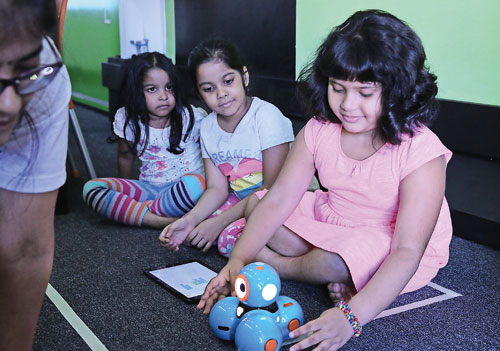Kids to code computer programmes

Children at Create Lab.
Apreschooler today will never drive a car when he grows up. Because, well, the cars will not need drivers. With all the new-fangled technological leaps that are in place, all cars will be driverless.
With unavoidable tech-filled futures ahead of this iGeneration, there’s little else that children are exposed to other than computers and related technology.
“Also kids nowadays will probably not need to see a general physician – something that we’re used to, because much of what they do will be taken over by AI (Artificial Intelligence),” says Thilan Wickramasinghe, Co-Founder/CEOof Create Lab, a Singaporean company that develops curriculums and teaches children 21st Century Skills such as coding, robotics and design. Create Lab has been expanding in Sri Lanka since January after setting up their own centre in Jaya Road, Colombo 4 with the Infotechs Group.
We are living in a world dominated by software – we use smartphones, television is delivered over the Internet; Google maps tell us the way and some of us shop online.
Sitting down for a discussion with the Business Times, he adds that technology is embedded more and more into our lives. “Our children’s world will be even more online and digital,” he adds noting that basic computer skills (such as word processing, spreadsheets) will get commoditised.
Learning just facts is less and less essential in a world where Google can answer just about any question in a matter of milliseconds. What will be more important and determine success will be the skills that will allow children to imagine, create, empathise and solve problems; essentially things computers cannot do. Computer programming or coding is a powerful way to introduce these skills.
In non-technical terms, coding is the moral fibre for creating all software, mobile apps and websites and everything in-between. It serves as the language that decipher commands, that makes computers take action – whether it’s printing a document or making a character fly in a game on a tablet.
Coding is the ability of telling a computer how to execute intricate tasks and with it you can create virtual worlds inside the computer where the only limit on what is possible is your imagination.
So it’s normal to guess that learning these skills gives kids an opportunity to have greater insight into the digital world they’re living in, and it will also be crucial to the jobs that they’ll be doing in the future. “Our children will grow up in a radically different world to ours and the skills they need will be radically different to any generation before them,” Mr. Wickramasinghe says adding that in 20 years, 65 per cent of the children will be doing jobs that are not even invented yet. So it’s better to prepare them now.
Major benefits of coding include teaching critical decision-making, and providing a sense of empowerment for creating something from nothing, say Dhruv Vohra, Co-Founder/President Create Lab, joining the discussion.
“Because coding is rarely flawless the first time, kids have to look at where errors occur, keep trying and then ‘debugging’ their code. This analytical thinking is a critical life skill.” Mr. Vohra adds “Coding skills teaches kids how to solve issues by looking at the bigger picture, and then develop ways to break them down into smaller and more manageable parts and then solving them piece by piece.”
This way of thinking also enables kids to analyse all the possibilities and make better decisions based on available resources and circumstances. “It makes them think critically, creatively, encourages team work and communication” Mr. Vohra adds. “This helps children to grow in the real world while also giving them a strong academic advantage in school because they have begun to develop a problem solving mind-set.” Teaching coding at a young age is also being praised as a way to get more girls involved in computer sciences, he says, noting that older kids are affected by the social belief system that says “computers are for boys”. With almost every job in the future requiring technological knowhow, it is essential to break this cycle with girls. Create Lab caters to children in the age group of six to 12 years.
Michelle Pinto, Director of Infotechs said they are glad to be associated with Create Lab in Sri Lanka.
She said that a number of countries – particularly the UK, Australia, US – have been moving to integrate coding and computing skills into their curriculums. Unfortunately, Asian schools are lagging behind choosing still to concentrate on rote learning and passing exams. Mr. Vohra says this is largely the reason for starting Create Lab – to teach essential skills that schools do not teach.
He says that Create Lab’s curricula, which they develop with academics from Oxford, MIT and Singapore’s top universities, focuses on children leading their own learning, at their own pace through various group and independent activities. It is one thing to know how to apply these technologies. It’s another, however, to realise the logic behind them. “That is what Create Lab focuses mostly on. We don’t teach one particular coding language or assemble a pre-designed kit. These will get obsolete eventually because of the fast pace of technology. What we want kids to take away is the ‘thinking’ behind using these tools to express themselves and use these concepts not just in our classrooms, but at school, at home and in their communities,” Mr. Wickramasinghe adds.


